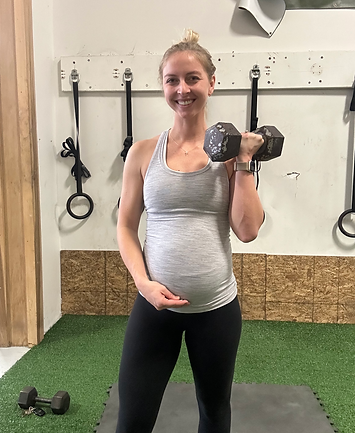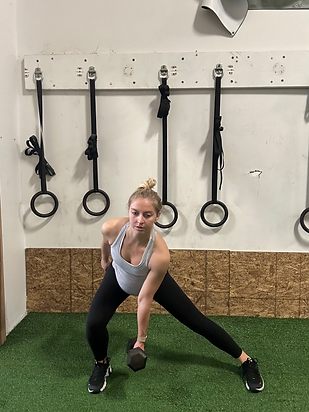
Common Misconceptions About Exercise During Pregnancy and the TRUTH Behind These Myths!
5/1/2025
Hi there!
Welcome to Reform's Newsletter, where we discuss hot topics in the physical therapy world, exercise tips, client wins, and upcoming events! As Mother's Day approaches, we will be addressing some Common Misconceptions About Exercise During Pregnancy and the TRUTH Behind These Myths! Whether you're expecting, planning for pregnancy, or supporting someone who is, understanding the facts about movement during pregnancy empowers you and your loved ones to make informed choices that support both your health and your baby's wellbeing.
5 Myths About Exercise During Pregnancy:
Myth #1: "Exercise is dangerous and increases the risk of miscarriage"
The Truth: Research consistently shows that moderate exercise does NOT increase miscarriage risk in normal pregnancies. In fact, regular physical activity may help reduce the risk of pregnancy complications like gestational diabetes and preeclampsia, which can lead to pregnancy loss when untreated. The American College of Obstetricians and Gynecologists (ACOG) confirms that exercise is safe and beneficial for most pregnant women.
Myth #2 "Your heart rate should never go above 140 bpm during pregnancy"
The Truth:
This outdated recommendation came from the 1980s and has since been replaced with more flexible, evidence-based guidelines. The original 140 bpm recommendation was a one-size-fits-all approach that didn’t consider individual fitness levels, health status, or pregnancy stage. Experts now focus on how you feelduring exercise rather than strict heart rate limits. I like to educate people on the Rating of Perceived Exertion Scale (RPE) -- a scale based on intensity ranging from 6-20, aiming for a 12–14 in terms of intensity, equivalent to "somewhat hard". This method account for differences in fitness, health status, and pregnancy stage. Many healthy, active pregnant individuals can safely exceed 140 bpm without risk—what matters most is tuning into your body and modifying activity when needed.
Myth #3: "You shouldn't start exercising if you weren't active before pregnancy"
The Truth: This belief is outdated and doesn’t align with current medical guidance. Exercise during pregnancy offers a wide range of benefits—even for those starting from a low activity level. The American College of Obstetricians and Gynecologists (ACOG) recommends beginning with just 5–10 minutes of physical activity per day, gradually increasing to 30 minutes or more of moderate movement if you have never exercised regularly before. I recommend working with a pelvic health physical therapist with a background in strength and conditioning, who can tailor a program to your needs—focusing on mobility, stability, and strength to prep your body for labor and support postpartum recovery. As always, listen to your body and work with your healthcare provider to create a safe, personalized plan.
Myth #4: "Lifting weights during pregnancy is dangerous"
The Truth: When done with proper form, modifications, and guidance, resistance training is not only safe for most pregnant individuals—it’s incredibly beneficial. Strength training helps maintain and build muscle mass, which supports your changing body, reduces injury risk, and prepares you for the physical demands of labor, delivery, and postpartum recovery. It also improves posture, boosts energy, supports joint stability, enhances metabolic health, and can help manage healthy weight gain. The type and intensity of strength training should match your starting point: beginners can start with bodyweight or light resistance, while experienced lifters can often continue training with adjusted loads and movement patterns. A pelvic health physical therapist or qualified prenatal fitness professional can help tailor a program to meet your needs safely and effectively.
Myth #5: Core Training During Pregnancy is Not Safe
The Truth: Quite the opposite! While certain core exercises likely will need to be modified, avoiding all core work during pregnancy is unnecessary and often counterproductive. Safe, intentional core training can help reduce back and pelvic pain, support the spine, and improve posture as your body changes. It also plays a key role in maintaining strength and stability through the pelvis and abdominal region, which can help with balance, labor endurance, and postpartum recovery. Core work during pregnancy doesn't mean abdominal crunches—think breathing-based movements, deep core engagement (like transverse abdominis activation), and exercises that promote control and stability. Working with a professional who understands prenatal adaptations can help you safely train your core and stay strong throughout pregnancy.
American College of Obstetricians and Gynecologists
Exercise Recommendations During Pregnancy:
- Duration and frequency: Aim for at least 150 minutes of moderate-intensity aerobic activity weekly, spread throughout the week (typically 30 minutes, 5 days per week)
- Intensity guideline: Use the Rating of Perceived Exertion (RPE) Scale, this ranges from 6-20, aim for 13-14 on this scale, which corresponds to "somewhat hard" exercise
- Activities to avoid: Contact sports, activities with high fall risk (skiing, horseback riding), scuba diving, hot yoga or exercise in very hot/humid environments
Warning signs to stop exercise:
Vaginal bleeding
Regular painful contractions
Leaking amniotic fluid
Dizziness or feeling faint
Shortness of breath before exercise
Chest pain
Headache that is severe or persistent
Muscle weakness affecting balance
Calf pain or swelling
My Personal Recommendation:
Incorporating 3–4 days of strength training alongside the recommended 150 minutes of cardiovascular activity per week can make a HUGE difference in preparing your body for birth and supporting your postpartum recovery. While rest and healing are essential after delivery, caring for a newborn involves frequent lifting, carrying, feeding, and bending. Maintaining strength in your core, upper body, and lower body can help reduce the risk of common postpartum aches and pains, support your physical recovery, and even contribute to a smoother childbirth experience.
**Keep in mind that every pregnancy is different. Be sure to discuss your exercise routine with your healthcare provider, who can help tailor recommendations to your individual health needs and pregnancy journey.
Benefits of Exercise During Pregnancy
The advantages of both cardiovascular and strength training throughout pregnancy are HUGE! This list by no means covers everything, but are some of the research backed reasons to incorporate exercise, as well as what I've seen in my clinical practice and personal experience throughout my pregnancy.
1. Reduced physical discomfort: Exercise can help alleviate common pregnancy complaints like back pain, pelvic pain, hip pain, constipation, bloating, and swelling.
2. Better mood and mental health: Physical activity releases endorphins that combat stress and anxiety, potentially reducing the risk of prenatal and postpartum depression.
3. Improved sleep quality: Regular movement can help address pregnancy-related insomnia and improve sleep depth and duration.
4. Better blood sugar management: Exercise helps control blood glucose levels, reducing the risk of gestational diabetes by up to 30%.
5. Healthier weight management: Staying active during pregnancy can help regulate weight gain, support healthy fluid balance to minimize swelling, and preserve muscle mass—all of which contribute to a smoother recovery after birth.
6. Enhanced physical readiness for birth: Labor is often called a marathon - building strength and endurance helps prepare your body for this intense physical event.
7. Faster postpartum recovery: Women who maintain fitness during pregnancy often experience quicker physical recovery after giving birth.
Another pregnancy fun fact for you all that I learned firsthand these past few weeks! Pregnancy increases your risk of developing kidney stones due to the increased pH levels of our urine, increased blood volume, amniotic fluid production, and the way we produce and excrete calcium during this time. Because of this, hydration is EXTREMELY important! Aim for 2-3L of water daily to help prevent kidney stones while pregnant :) Trust me, it is NOT a fun thing to experience ever, especially not pregnant!
Thank you so much for following along, and stay tuned for what's to come next month! Feel free to share with family and friends who may be interested and reply back with any questions!
Talk to you soon,
- Dr. Dana LaPeze



